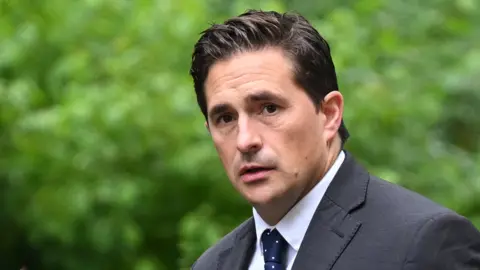Minister says he tried and failed to disprove alleged SAS war crimes
 Getty Images
Getty ImagesVeterans Minister Johnny Mercer told a public inquiry he was "desperate for some sort of evidence" to disprove alleged war crimes by the SAS in Afghanistan but was unable to find any.
Special forces commanders were "unable to answer basic questions", he said.
The minister was speaking at a public inquiry on Tuesday examining alleged war crimes by UK special forces.
He said he had received warnings from multiple members of special forces that the allegations may be true.
Mr Mercer, who served with a Special Boat Service (SBS) task force in Afghanistan from 2008 to 2009 and attempted to pass selection for the UK's elite special forces units, told the inquiry that he had detected an "odour" around the Special Air Service (SAS) during his time with the armed forces and special forces selection process.
He confirmed that the "odour" stemmed from stories of the regiment illegally killing people on operations in Afghanistan who posed no threat to British troops.
Mr Mercer said that he was later warned by serving members of special forces, including friends, that there was credibility to the allegations of executions and other illegal practices.
The Independent Inquiry relating to Afghanistan, launched in the wake of reporting by BBC Panorama and other media outlets, is investigating whether British special forces killed civilians and unarmed people on night raids in Afghanistan between 2010 and 2013.
Mr Mercer told the inquiry that after he became veterans minister, he was asked by then-defence minister Ben Wallace to "get to the bottom" of rumours swirling within the military that the SAS had carried out extrajudicial killings.
The request came after Mr Mercer raised serious concerns within government about the allegations.
Mr Mercer said he embarked on his investigations "desperate for some sort of evidence to disprove these allegations, because I don't want to believe them, I don't want to believe them from that unit".
He said: "I respect those units, I have friends in those units who were killed in operations, I have friends who were never the same person again after Afghanistan.
"At every stage I have tried to find something to disprove these allegations but I have been unable to."
Mr Mercer told the inquiry he had sought assurances from UK Special Forces commanders but received "implausible" versions of events.
"Anyone who has any experience of these operations would go, 'that's not possible'," he said.
The minister said he was told by then-Chief of the General Staff, General Sir Mark Carlton-Smith and then-Director Special Forces, General Sir Roland Walker that the allegations had been thoroughly investigated and were untrue but the assurances "did not set my mind at ease".
Mr Mercer went on to tell Mr Wallace that he did not believe the accounts given by General Carlton-Smith and General Walker.
"I think my words were 'something stinks'," Mr Mercer said.
He added that when he challenged Gen Walker about what he was told was a lack of any video footage from the operations under scrutiny, the Director Special Forces lent back on his chair and shrugged.
The minister also told the inquiry that he had received a direct account from a serving member of the SBS who said he had been asked to carry a "drop weapon".
Mr Mercer said drop weapons were non-Nato weapons carried by UK Special Forces units that could be planted on the body of someone killed during a mission, to falsely suggest the unarmed victim had posed a threat to British troops.
In heated exchanges with the counsel for the inquiry, Mr Mercer repeatedly refused to provide the names of those who had warned him there might be truth to allegations of extrajudicial killings, as well as the member of the SBS asked to carry a drop weapon.
The minister also repeatedly refused to answer whether he agreed that the member of the SBS had important evidence to share with the inquiry, responding only that "multiple people have important evidence".
"There are multiple people across these organisations who have knowledge of, for example, drop weapons," he said.
Mr Mercer's refusal to provide the names prompted the Sir Charles Haddon-Cave, the chair of the inquiry, to intervene in proceedings and ask Mr Mercer to "reflect" on his refusal during the lunch break in proceedings.
Mr Mercer said he would reflect but added that he would not provide the names "at this stage".
The minister told the inquiry that he was keen to seek assurances about allegations of extrajudicial killings because he was at that time publicly backing a bill designed to put a stop to what he characterised as "vexatious" legal cases against veterans.
Tessa Gregory, a partner at Leigh Day, the law firm representing some of the Afghan families whose relatives were killed by the SAS, said Mr Mercer's testimony "lays bare the depth of concern that has existed for years within the army and at the highest levels of government that UK Special Forces were carrying out extra judicial killings in Afghanistan".
The inquiry will also look at whether a prior investigation by the Royal Military Police called Operation Northmoor, which was brought to a close in July 2019 with no charges, was inadequate.

Do you have information about this story that you want to share?
Get in touch using SecureDrop, a highly anonymous and secure way of whistleblowing to the BBC which uses the TOR network.
Or by using the Signal messaging app, an end-to-end encrypted message service designed to protect your data.
- SecureDrop: http://kt2bqe753wj6dgarak2ryj4d6a5tccrivbvod5ab3uxhug5fi624vsqd.onion/
- Signal: 0044 7714 956 936
Please note that the SecureDrop link will only work in a Tor browser. For information on keeping secure and anonymous, here's some advice on how to use SecureDrop.

